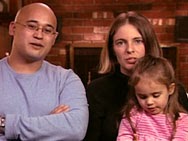|
 By Judy Arnall By Judy Arnall
Many parents wonder when and how to start discipline for their babies. But what should a parent do if a 6-month old baby refuses toys and wants to be constantly held? What to do if a 9-month old child makes a b-line for a CD-rack to play with the treasured music collection? What if a 10-month old baby flings food from the high chair? The key is to respond with appropriate discipline.
Discipline can mean many things, but in this context, it means instruction or teaching (Latin noun disciplina: knowledge or instruction). Discipline can be loving, kind and firm, keeping intact the dignity and respect of both parent and child, and should not be confused with hurt or punishment.
Teaching a baby starts at birth. A parent who picks up a crying baby is teaching the baby that its distress matters to the parent, and that the baby can trust that the caring parent will be there to comfort it and make the world right. A parent who trades a CD case for a rattle teaches that some things are appropriate for playing and some things are not. A parent who takes a bored and restless baby from the confines of a highchair teaches that the baby’s needs are recognized.
A common concern of parents (and advisory grandparents!) is that children learn to manipulate their parents. Babies and toddlers do not have the cognitive skills to manipulate their parents in a negative way.
The Ideal approach to baby discipline:
Meet the parents’ needs! Parents have to plan and look after their own well being, regenerate their patience, before they can consistently meet the needs of their children. If a parent is feeling angry at the baby’s behaviour, it helps to take a few minutes to make a safe choice, and while making sure the baby is safe, breathe slowly and calm down. Phone a friend or find support. Constant supervision. It is amazing and terrifying how quickly a baby can discover a hazardous situation. Redirect the baby away from inappropriate items, and offer a substitute. Focus upon meeting the baby’s needs. Are they hungry, bored, or tired? Each baby is different and has different needs. Learn child development. Understanding what is normal behaviour helps to frame it differently. Babies cry to communicate, not to manipulate. Child-proof. Children have plenty of time and the cognitive ability to understand what’s off limits during the preschool years. Until then, make it easier on yourself and the baby and put away all the “no touch” items. Prevention-think ahead. Try to anticipate the times and places that your baby’s behaviour deteriorates. Avoid them and try to plan ahead. If you know that your baby starts throwing food off the high chair when he’s not hungry anymore, try to get him out before the mashed potatoes hit the wall. Parents can benefit from understanding the child’s typical stages of learning, including development of language, cognitive and social skills. For example, the command “No!” seems very simple and clear, but the concept and expectations are actually quite complex and abstract to a child under age 3 who has very poor impulse control. Parents who attend parenting classes can gain a head start on what to expect, explore and what to discuss before their babies start walking.
Our Adverts: http://arigonbud.com.ua/
|
|